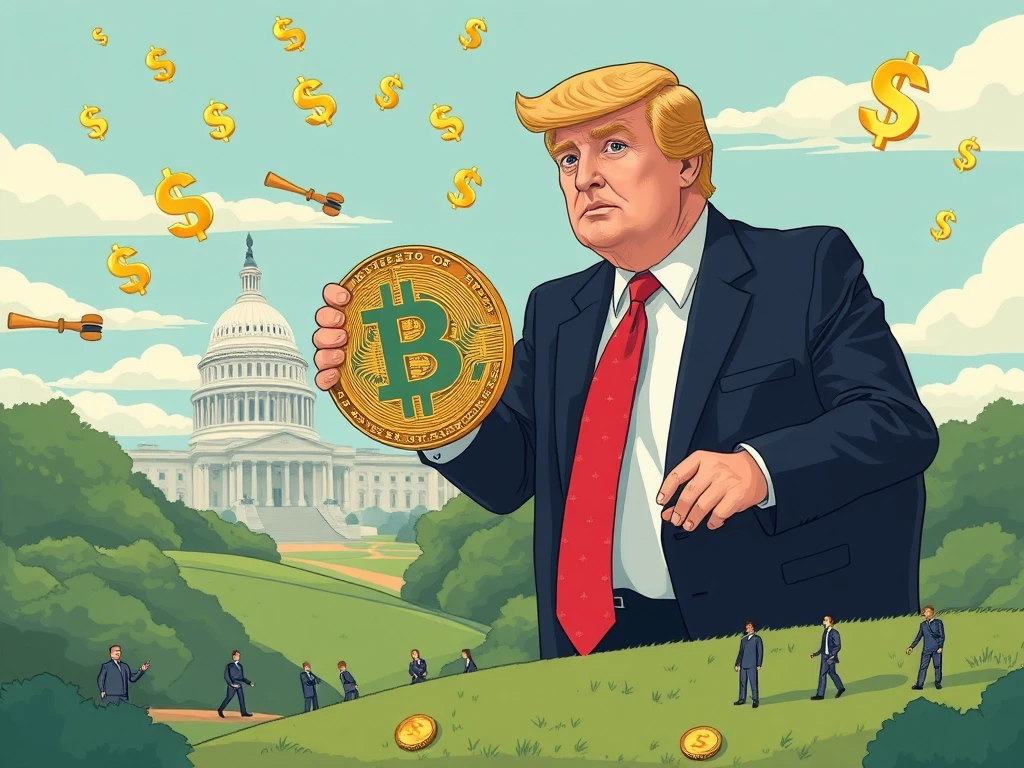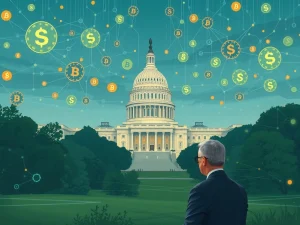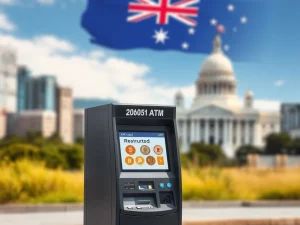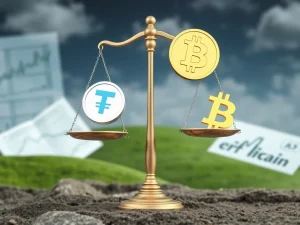Warning: Trump’s Crypto Agenda – Is It Rigged for the Rich?

There’s a lot of buzz around cryptocurrency right now, and political figures are increasingly engaging with the space. Donald Trump has voiced support, leading some to believe this signals a new era for digital assets. However, a critical look at the Trump crypto agenda suggests that the benefits might not be evenly distributed. This article explores the perspective that recent moves could be consolidating power among political elites and wealthy investors, potentially leaving everyday users on the sidelines.
Understanding the Trump Crypto Agenda and Financial Freedom
Cryptocurrency was born from a desire for financial freedom, aiming to provide alternatives to traditional, centralized systems. Bitcoin emerged after the 2008 financial crisis as a radical experiment in financial sovereignty, intended for the average person, not primarily for hedge funds or political insiders. The core idea was to create a more transparent and accessible financial landscape.
However, critics argue that the current political approach, particularly under the Trump crypto agenda, seems to prioritize strategies that benefit a select few. While the rhetoric champions deregulation and innovation, the practical outcomes, according to this view, appear to favor those already holding significant capital and political connections.
Concerns Over Crypto Regulation and World Liberty Financial
A key area of concern is the approach to crypto regulation. The Trump administration has taken steps seen as aggressive deregulation. While framed as fostering industry growth, these moves raise questions about oversight and potential conflicts of interest.
A notable example cited is World Liberty Financial, a crypto venture reportedly tied to Trump’s sons. This entity launched its own stablecoin and digital tokens around the same time the administration began easing oversight. Critics point to this as a clear instance where deregulation could directly benefit politically connected businesses, potentially giving them an unfair advantage and insulating them from the scrutiny that other players might face.
Furthermore, reports about the Department of Justice disbanding its national cryptocurrency enforcement team, which previously targeted issues like money laundering and fraud, have fueled concerns. Reduced enforcement capacity could create an environment where financial misconduct is less likely to be investigated, disproportionately affecting smaller investors who lack the resources to protect themselves.
The Growing Influence of Crypto Politics
The increasing intersection of crypto and politics is changing the landscape. The rise of assets specifically linked to political figures, sometimes called “politico-coins,” highlights the growing role of crypto politics. These tokens often rally based on loyalty and influence rather than underlying technology or utility.
There’s a growing concern that political actors are leveraging the crypto space to build new forms of centralized influence and control, which runs counter to the decentralized ethos of many cryptocurrencies. This politicization risks turning crypto into another tool for political maneuvering and wealth accumulation for insiders, rather than a truly open and accessible financial system.
Who Benefits from This Crypto Agenda?
If the focus remains on deregulation that favors connected ventures like World Liberty Financial and the proliferation of assets driven by crypto politics, who gets left behind? The original promise of using crypto to empower the unbanked, those sending remittances, or individuals in countries with unstable currencies seems to fade into the background.
The current trajectory, according to critics, suggests that while the concept of financial freedom is promoted, the practical benefits are being channeled towards those already in positions of power and wealth. Everyday investors are left navigating a market potentially skewed by political influence and reduced regulatory oversight.
Moving Forward: Reclaiming Crypto’s Promise
The critique of the Trump crypto agenda isn’t just about one administration; it’s a broader question about the future direction of cryptocurrency. Will it fulfill its potential as a tool for broad financial empowerment and financial freedom, or will it become another system primarily serving the wealthy and politically connected?
For crypto to live up to its revolutionary potential, the community may need to refocus on its core mission: providing real, accessible financial tools for everyone. This means prioritizing utility, education, and robust, fair regulation that protects all participants, not just those with insider access or political influence. The goal should be to break the mold of traditional finance, not simply replicate its inequalities within a new technological framework.










